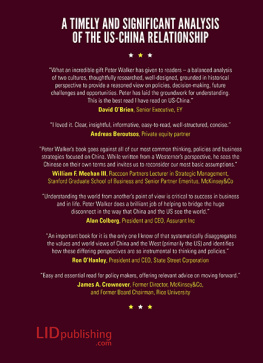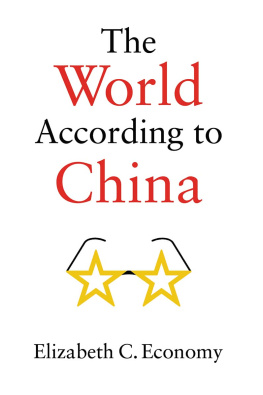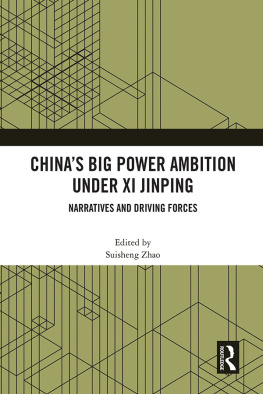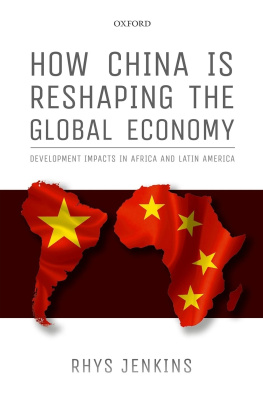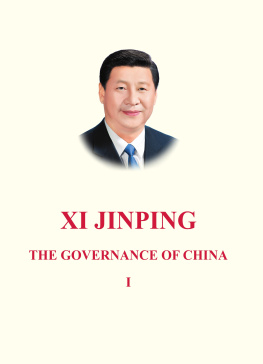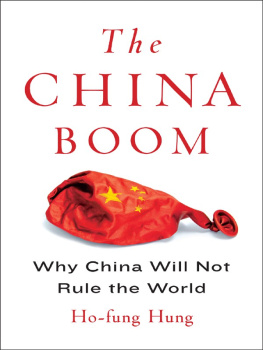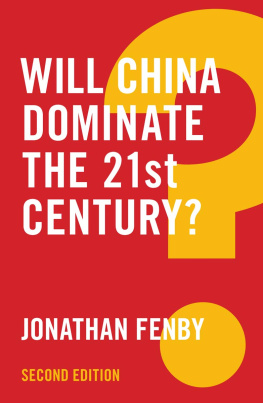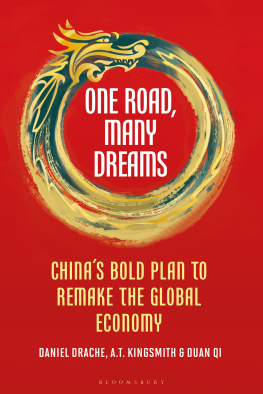
ADVANCE PRAISE

I really enjoyed reading it! Peter Walker has done a wonderful job in laying out the cultural, philosophical and historical foundations for both countries and comparing them side by side.
Catherine Mengyun Yang , TIE-SEI Fellow, The Fletcher School of Law and Diplomacy, Tufts University
The timing of writing on this subject is perfect and the approach that Peter Walker takes in comparing the two cultures/histories is very enlightening An important read.
Claude Dussault , Chairman, Intact Financial Corporation
Peter Walker has written a brilliant book about China and America. Walkers accurate descriptions of the differences in worldview between the US and China are exactly what the US needs to understand China and for China to better understand the US.
Richard N. Foster , Author of Innovation: The Attackers Advantage and Creative Destruction
Powerful, Different, Equal makes the formerly mysterious so easy to understand.
Deanna Mulligan , CEO, Guardian Life Insurance
To Francine, my rock. Kimberly and Sarah, who did much of the heavy lifting, and Pamela and Janet, who are always there for me.

CONTENTS


ACKNOWLEDGMENTS

Writing this book was a family affair, with Francine always pushing for balance, Kimberly streamlining and sharpening the prose, and Sarah tracking down the facts and the sources.
A special thanks to Catherine Yang, a student at the Fletcher School who spearheaded much of the research. Also, a big thank you to many friends and former colleagues who provided helpful input on the structure and tone of the book, including Andreas Beroutsos, Alan Colberg, Jim Crownover, Claude Dessault, Zach Dykehouse, Dick Foster, Tom Hardy, Paul Mas, Bill Meehan, Deanna Mulligan, David OBrien, Ron OHanley, Hank Walker and Catherine Yang.
A final thank you to my publisher, LID Publishing, for helping a first time author get off the ground Martin Liu, Susan Furber, Maria Cid and Francesca Stainer.

INTRODUCTION

Let China sleep, for when she wakes, she will shake the world.
Napoleon Bonaparte
My first connection to China was a spiritual journey over 35 years ago. I wanted to identify with and learn from the lives of individuals who died with a smile. That journey took me east, to Taoism and the Tao Te Ching written by Lao-tzu in the 6th century BC.
Since then I have taken over 80 trips to China, connecting with hundreds of individuals: Chinese business executives and managers, regulators and other governmental officials, experts in a wide range of social and economic fields, and many individuals interested in Taoism.
I gained a very positive impression of China through three and a half decades of relationships and interactions. I witnessed highly competent and educated executives and government officials, happy and optimistic people with a high level of pride in what China has accomplished, a high level of confidence in the central government, a profound awareness of Chinas history and culture, and a strong commitment to family, the future of China and its people.
Over the last 25 years I have read extensively on Chinese history, philosophy and literature, including many books on China written by Western authors. I also closely followed articles and editorials written in the Western press, specifically The New York Times , Financial Times , The Wall Street Journal and The Economist . While I believe some writers deeply understand China, Thomas Friedman, Henry Kissinger and Hank Paulson for example, the larger, emerging picture of China based on my readings is very different from my personal experiences.
The readings suggest an authoritarian and harsh Chinese government oppressing an unhappy population that experiences a total absence of human rights. They speak of China as a heavy polluter indifferent to the environment, an economy thriving thanks to unfair trade practices supported by an undervalued currency, a lack of innovation and the systematic theft of Americas intellectual property. They fear a growing and aggressive military threat, the violation of the rights of the people of Taiwan and Hong Kong and suppression of minorities in Tibet and Xinjiang. They draw unfair parallels between Communist China and the former Soviet Union, which was known for its aggressive military, and its failed and centrally managed economy, with leaders stealing the countrys wealth at the expense of people.
I tried to dig into the root causes of this disconnect and this book presents my findings.
I should confess from the outset that this book represents a synthesis of my experiences and impressions in China and ideas from a wide range of sources. Original research is modest and the book focuses on the core story. To the best of my abilities, it is intended to be balanced, objective, logical and consistent with the basic facts.
My first step is understanding the fundamental characteristics and drivers of the US and Chinese governance, economies and social models. The first conclusion is they are very different on many core dimensions and that those differences are largely rooted in each countrys history and culture.
The US model is best described as:
Individualistic
Ideological
Dualistic: right/wrong, winners/losers
Minimalist role of the government domestically
Electoral democracy
Economic model based on capitalistic free enterprise and open markets
Absolutist approach to human rights
Expansive view of global role spreading democracy and human rights
These characteristics reflect the will of the early settlers, who left Europe to escape limited economic opportunities available to lower socio-economic classes and the absence of human and religious rights. Since its founding, the US benefited from a relatively benign environment, with few foreign threats, safe borders and abundant natural resources.
The Chinese model is best described as:
Strong central government run today by the Chinese Communist Party
Consensus-driven and efficient decision-making similar to a corporate governance model
A democracy, defined as a government responsive to the people
Leaders selected through meritocracy, not by popular election (except at the local level)
Collective, with the family and societys wellbeing of far greater importance than the individuals
Relativist rather than absolutist approach to human rights
Highly pragmatic versus ideological mindset focus on consequences rather than a right or wrong
Modest but growing global aspirations driven by economic self-interest and territorial integrity, as opposed to spreading the Chinese model
To develop a deeper understanding of these differences, this book explores a number of core drivers and their implications. The overall conclusion is that the major driver of misunderstanding is the USs judgement of China through Western eyes, without regard for the role Chinas history and culture play in shaping who China is today. As an illustration of the magnitude of the two different views of China, I have included two quotations from David Sham-baughs book, China Goes Global . From the author: This suggests to me that it is not so much an aggressive or threatening China with which the world should be concerned, but rather an insecure, confused, frustrated, angry, dissatisfied, selfish, truculent, and lonely power. Whereas Vice Foreign Minister Fu Ying has a different take on the issue: We dont view ourselves as a superpower. You are not going to see a US or Soviet Union in China. You are going to see a culturally nourished country with a big population, being more content, being happy, being purposeful and it will be a friend to the world. There is no reason to worry about China.
Next page
